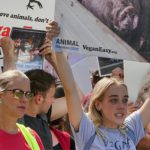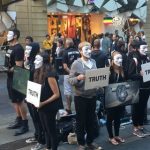Silencing Dissent: Government Demonises and Targets Animal Welfare Activists

Recently appointed Australian agriculture minister Bridget McKenzie has vowed to continue the Morrison government’s crackdown on animal welfare activists with the fast tracking of new laws aimed at preventing protests being carried out by those she terms as “agri-terrorists”.
Prime minister Scott Morrison first spruiked the laws that could see activists imprisoned for up to 12 months for disclosing information about factory farms or encouraging others to trespass upon them, following nine nonviolent actions that were carried out nationwide in April.
McKenzie told the PM that she plans on introducing the laws in the first sitting week of parliament and she’s confident he’s on board with the idea. And the Nationals deputy leader is also focused on getting recent restrictions placed on the much-derided live exports industry reversed.
While McKenzie’s use of the word “terrorist” to describe advocates campaigning against cruelty towards animals might seem dubious, it’s actually part of a global trend that sees vegan activists being likened to those who perpetrate acts of violence to achieve their political ends.
And these “misinformed, self-righteous, extreme animal activists”, as McKenzie also likes to call them, assert that the reason why politicians around the world are making such an unlikely association is due to their vested interests in an industry that helps stoke their campaign coffers.
Silencing dissent
When Morrison first threatened these new laws, he singled out animal rights charity Aussie Farms for special chastisement, as it has a map on its website detailing the locations of factory farms nationwide, which is an example of the type of disclosures the government wants to put an end to.
“Threats to whistleblowers smell like an attempt to actually stifle transparency. That’s exactly what these proposed laws are about,” said NSW Animal Justice Party MLC Emma Hurst. “They’re unlikely to deter activists. Members of the public have become so worried about animals.”
Recently elected as the second AJP member of NSW parliament, Ms Hurst told Sydney Criminal Lawyers that the proposed laws would not only “increase tensions between animals advocates and farmers”, but the price of incarcerating activists would be a complete waste of taxpayers’ money.
And Hurst added that the use of “agri-terrorist” is “disgusting”, especially in light of Christchurch. “That’s an act of terrorism,” she stressed. “Wanting to protect animals, being concerned about the way they’re treated and the ethics around that are actually forms of compassion.”
The right to know
According to Matt Stellino, a spokesperson for Animal Rights Activism Sydney, the lumping together of animal activists with crazed gunmen is the government’s attempt to sway public opinion against their cause, so as to stop droves of people turning away from an industry it benefits from.
“If people thought vegan activists were there not only to do a service to animals, but also a service to them and ensure that they’re able to shop without supporting these outright cruel practices,” Stellino explained, “then the government wouldn’t be able to sway them.”
And as the for the law that could see 12 month prison terms imposed for “outing businesses that are harming animals”, Stellino believes it’s “absolutely ridiculous”. And he added that most consumers – regardless of what they choose to eat – don’t support cruelty to animals.
A drawn-out death
Minister McKenzie also plans to roll back the restrictions that her predecessor David Littleproud placed on live animal exports, after video footage emerged in April last year of over 2,400 sheep dying due to heat exhaustion and lack of food as they were being shipped to the Middle East.
Currently, the live animal export industry has placed a self-imposed ban on the practice over the northern hemisphere summer, so as to reconsider its standards, while a recent Vote Compass poll revealed that almost two-thirds of Australians want to see the practice completely banned.
“It just goes to show that this minister’s not taking on the views of the Australian people. The majority want the export of live animals stopped,” Ms Hurst continued. “There’s no ethical or high welfare way of live exporting animals to other countries.”
Impacting the climate emergency
Another aspect of agribusiness that vegan activists are trying to draw attention to is the devastating effect it’s having on the environment. The methane, nitrous oxide and carbon emissions generated by the industry amount to more than the total greenhouse gases produced by transport combined.
New Zealand’s ground breaking Zero Carbon Bill, which was introduced into parliament last month, aims to cut the nation’s non-agricultural carbons emissions to zero by 2050, and it will also apply methane reduction targets to agribusiness.
Stellino explained that it’s difficult for the government in this country to place these sort of emission restrictions on primary food producers, as the cost of living will go up and the Coalition will get the blame for the rising costs.
But, the animal activist said he would “absolutely love to see a carbon emission-style tax brought” in for cattle and dairy. And he said that while individuals can’t personally control the emissions that businesses are generating, they can control what they put in their trolleys and into their mouths.
Keeping cruelty hidden
“If the government seriously wants to reduce trespass, there’s a simple solution and that’s transparency,” Ms Hurst put forth, adding that a system of having readily accessible CCTV cameras in factory farms could help to keep the industry accountable.
And as an example of an everyday practice that agribusiness doesn’t see as an ethical issue, Hurst mentioned overcrowded windowless sheds filled with thousands of chickens that are growing at such a rapid rate that they can’t stand and develop blisters from lying in built-up faeces.
“If there was transparency in this industry, there would be no one trespassing to expose what’s happening behind those closed doors,” Ms Hurst concluded, “you’d actually take away the motivation for trespass.”







